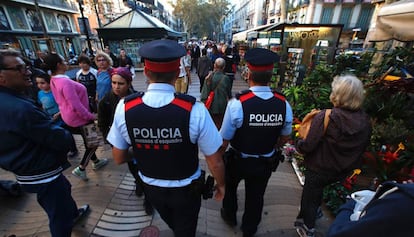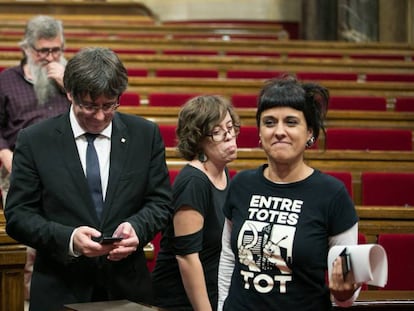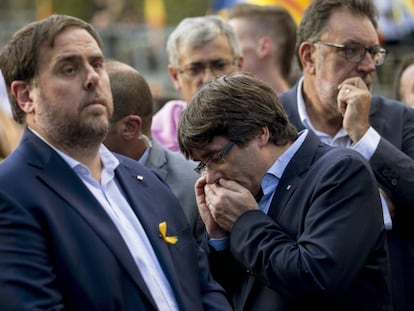Breakdown in Spanish police relations may hamper fight against terrorism
Division between national forces and Catalonia¡¯s Mossos d'Esquadra can now be felt at all levels

Relations between the Spanish National Police and the Civil Guard, on the one hand, and the Catalan police force, the Mossos d¡¯Esquadra, have hit rock bottom. Joint operations are on hold, medals have been handed back and some Civil Guard officers have stopped working as instructors at the Mossos police academy.
Relations between the forces haven¡¯t always been easy, but in the past it was chiefly the top brass who were at loggerheads
The deterioration in relations can be seen even at the most basic level, in situations like the non-sharing of tables in canteens, and it¡¯s not just the top brass who are divided: the breach has affected all levels.
But it¡¯s at the operational level, in areas including investigation and information-sharing, that the breakdown is hurting most. In terms of information-sharing, the failure of communication began with the terrorist attack in Barcelona on August 17, with accusations of disloyalty coming from both sides, according to police sources consulted for this article.
Those problems have deepened during recent events in Catalonia, culminating with the independence referendum of October 1, when many believe that the Mossos failed to carry out their duty to prevent people from casting their ballots in a vote that had been banned by the courts.
But inter-force problems aside, nobody denies that terrorism remains a top priority. ¡°Naturally, we are pushing ahead with the operation related to the Barcelona attacks and coordinated by the Intelligence Center against Terrorism and Organized Crime (CITCO),¡± says one high-ranking officer with the Mossos. The Catalan police force is still attending weekly meetings on terrorist threat assessment. ¡°We go wherever we are invited as police,¡± the officer stresses.
Things that used to be a? phone call away now have to be done in writing
On the investigative front, however, there is a freeze in joint judiciary-led operations while everyone waits for someone else to take the initiative, sources within the different forces agree. ¡°Communication is down to the bare essential. We are waiting to see what happens,¡± another high-ranking police officer says.
At the day-to-day level, there has been a slowdown as well. ¡°Now a reply to a normal request takes longer, like the ones made to Immigration (which is under the exclusive control of the National Police). And things that used to be a phone call away now have to be done in writing,¡± investigators say. ¡°The buddy feeling is gone, but everyday work relations are the same. You can¡¯t let your differences end up harming women, for instance, who are victims (in abuse cases),¡± another police source working in immigration says.
On the street, relations between the law enforcement agencies are also cool. Mossos and National Police officers share guard duty outside government buildings. In the past, both forces worked side by side. ¡°Now we are generally not even on the same sidewalk, and we stand across from them, or, if there are a lot of people, between the crowd and the National Police,¡± says one Mossos source.
It¡¯s the same at the courts. ¡°If the National Police bring in detainees, they are anxious to leave. Before it was different, they would say hello and talk for a while,¡± one police source explains. The story is similar in prisons too, where cold relations are the order of the day.
Inter-force problems aside, nobody denies that terrorism remains a top priority
No one denies that relations between the law enforcement agencies haven¡¯t always been easy, but in the past it was chiefly the top brass who were at loggerheads. Operating teams would try to stay away from that kind of conflict.
¡°That is going to be hard now. No one is going to forgive the fact that car windshields were broken while detainees were being taken out, and they [the Mossos] just stood there with their arms crossed,¡± says another Civil Guard source, referring to the events of September 20.
On that day ¨C and well into the early hours of September 21 ¨C thousands of protesters congregated in front of the Barcelona building that houses the Catalan government¡¯s department of economic affairs, to protest the arrests of several officials involved in organizing the illegal independence referendum of October 1. The protest hindered the work of officers who were inside the building in search of election material to confiscate. The judicial representative who was overseeing the court-ordered search was forced to leave the building from the rooftop, and three Civil Guard patrol cars were vandalized.
The head of the Mossos, Josep Llu¨ªs Trapero, is being investigated for possible sedition in relation to events of that day.
English version by George Mills.
Tu suscripci¨®n se est¨¢ usando en otro dispositivo
?Quieres a?adir otro usuario a tu suscripci¨®n?
Si contin¨²as leyendo en este dispositivo, no se podr¨¢ leer en el otro.
FlechaTu suscripci¨®n se est¨¢ usando en otro dispositivo y solo puedes acceder a EL PA?S desde un dispositivo a la vez.
Si quieres compartir tu cuenta, cambia tu suscripci¨®n a la modalidad Premium, as¨ª podr¨¢s a?adir otro usuario. Cada uno acceder¨¢ con su propia cuenta de email, lo que os permitir¨¢ personalizar vuestra experiencia en EL PA?S.
?Tienes una suscripci¨®n de empresa? Accede aqu¨ª para contratar m¨¢s cuentas.
En el caso de no saber qui¨¦n est¨¢ usando tu cuenta, te recomendamos cambiar tu contrase?a aqu¨ª.
Si decides continuar compartiendo tu cuenta, este mensaje se mostrar¨¢ en tu dispositivo y en el de la otra persona que est¨¢ usando tu cuenta de forma indefinida, afectando a tu experiencia de lectura. Puedes consultar aqu¨ª los t¨¦rminos y condiciones de la suscripci¨®n digital.










































